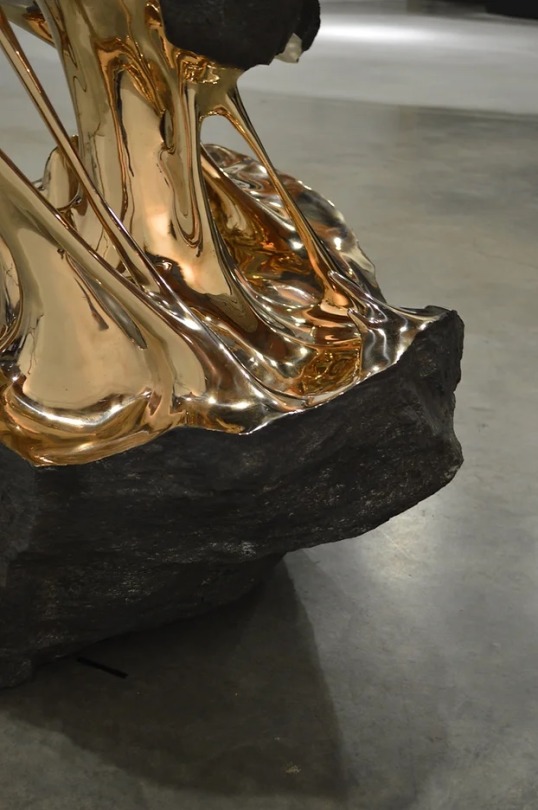242 posts
Latest Posts by systemsdeployedtofighttimetravel - Page 6
PETROLEUM TIME TRAVEL
Copper Time Travel
Laser cleaning a coin, with water added | source




Self-taught sculptor Romain Langlais turned to bronze, a metal he now incorporates into works that are inspired by nature rather than man. His pieces visually pull apart the natural objects that surround us—building works that appear as bisected rocks, boulders, and tree trunks. These sculptures showcase glistening bronze protruding from their insides, unleashing the perceived inner energy of each object.
See more work by Romain on his website.
thinking about the time galen was having an argument about the existence of a bone in an elephant's heart with a rival and in order to win he demanded that someone go fetch the heart from an elephant that was being cooked up in the emperor's kitchen (???) and bring him the bone from it and he was so proud about winning that he kept it to show off to other people

I just learned this fact and I can't help but share it with you!!!
In 13th-century European castles, separate fortresses were rarely built. Instead, one of the towers was significantly larger than the others and served as sleeping quarters for the lord or the king and his family.
Medieval life was full of changes and conflicts. Periods of peace were often interrupted by wars and sieges. To protect the ruler and his family, spiral staircases were built in the towers, winding clockwise. This design made it harder for attackers, as defenders could strike while using the wall as a shield, whereas attackers, especially right-handed ones, faced difficulties.

Additionally, the steps were uneven in height and length, making it easier for defenders, familiar with the layout, to move quickly. Attackers, in heavy armor and unfamiliar with the stairs, risked losing balance. This design significantly complicated sieges, particularly when climbing upward, giving defenders an advantage.
Thus, clockwise spiral staircases were not only convenient but also a crucial part of defensive strategy.

Garry Kasparov, world champion chess player, succumbing to his public defeat by Deep Blue, IBM: a 'supercomputer' in development at the time. — MAY 11, 1997
AUTOMATIC CLAPPING XBOX TERMINATOR GENISYS











I had a breakthrough yesterday that I've been fervently working on. With what I know about image compression and terminals I was able to implement image and animation display in terminals with color. I'll show a few examples and then explain the significance (I can't show the animation right now because I can't record it at the moment).
Note: These images were automatically optimized not manually, better quality is possible these are samples


The reason this matters is we now have a way to transport graphics in a very optimized way in which we only have to store the indexed colors and the positional data for the colors (which we have a novel method of optimizing) notably you only have to send the indexed colors once for an animation or stream of images. This provides us the ability to render graphics with no GUI so with far less overhead.
TLDR: We have an entirely new way to send and receive images/animations/streamed sequences
For the more technically interested read on
This uses the Python Curses wrapper, unicode block elements and Pillow to achieve this. The limitations are loose but input images will automatically be posterized to handle the 255 color limit of Curses (a little fuzzy on if there are ways around this beyond the fg/bg doubling idea I'm thinking qbout, I'll look into it soon) and your image needs to be a width and height that can be displayed within your particular terminal setup ex: a 32x32px image needs 32 lines and 32 columns.
To accommodate this for PierMesh we can use the ShrinkRay optimizations.

Frank Rosenblatt, often cited as the Father of Machine Learning, photographed in 1960 alongside his most-notable invention: the Mark I Perceptron machine — a hardware implementation for the perceptron algorithm, the earliest example of an artificial neural network, est. 1943.

Data, Spot and the kittens



























